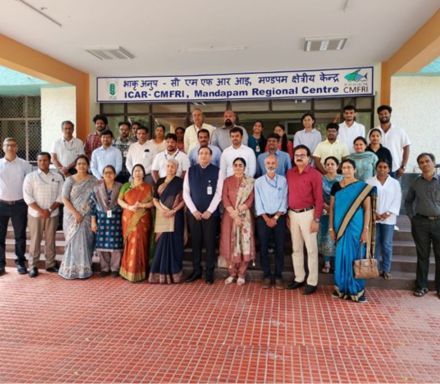
Dr. A. Gopalakrishnan steps down as Director, ICAR-CMFRI
He leaves behind transformative initiatives in marine fisheries to uplift fisher community
Dr. A. Gopalakrishnan retired as the Director of the ICAR-Central Marine Fisheries Research Institute (CMFRI) on 31st July 2024, leaving behind a slew of ground-breaking research and initiatives for the betterment of the fisher community and the advancements of India's marine fisheries sector. He assumed the charge on July 31 2013.
During his remarkable 11-year tenure, Dr Gopalakrishnan spearheaded numerous community-centric initiatives, with a particular focus on women empowerment, transgender mainstreaming, and start-up boosting in the marine fisheries sector. By providing training in diverse areas such as fish farming, cage culture, seaweed cultivation, ornamental fish farming, and mussel and oyster farming, along with marketing skills, CMFRI extended support to the communities to become small-scale entrepreneurs. Consequently, hundreds of women's self-help groups have been formed nationwide, showcasing the successful implementation of these empowerment programmes.During his tenure, CMFRI secured approximately Rs. 150 crores in external funding from different agencies to support various research projects. Dr Gopalakrishnan signed MoUs for research collaboration with 80 institutions, in addition to 45 consultancy projects. CMFRI received over 140 national and international awards during his tenure. In 2019, CMFRI was awarded the Sardar Vallabhbhai Patel Award, given to the best research institution under ICAR.
Dr Gopalakrishnan fostered a welcoming environment at CMFRI, encouraging fishermen to directly engage with the institute to pass on their concerns. Efforts to popularise CMFRI's mariculture technologies such as cage fish farming and Integrated Multi-Trophic Aquaculture (IMTA) turned into a huge success with thousands of coastal families earning profit by adopting these technologies.Coming to the major research works, his tenure saw the completion of landmark studies such as the marine fish stock status report (MFSS 2022), genome sequencing of Indian oil sardine, identification of new species, and the development of 14 nutraceuticals from seaweeds to mention a few. Additionally, his team successfully developed seed production techniques for 13 marine food fishes and 18 marine ornamental species, identified optimal sites for seaweed and cage fish farming, established national brood bank for boosting seed production, and conducted comprehensive carbon footprint assessments from India's marine fisheries.
The institute, under his guidance, also played a crucial role in implementing Minimum Legal Size (MLS) regulations to curb juvenile fishing, publishing and creating public awareness on annual marine fish landing estimates, scientific and technical guidance for government policies, climate change and biodiversity studies, socio-economic assessment, etc.















